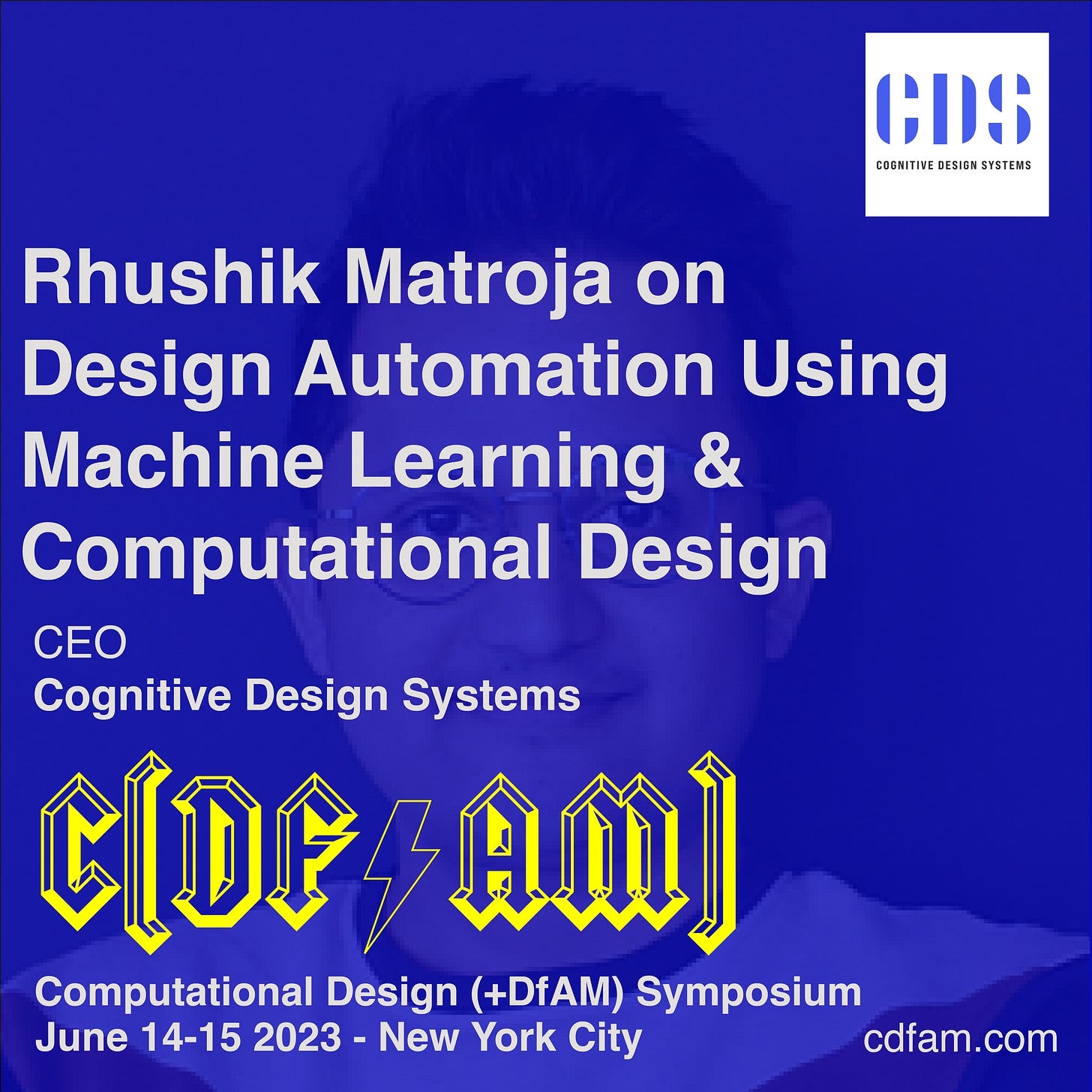Rhushik Matroja on Design Automation Using Machine Learning & Computational Design
CDFAM Expert Speaker Interview Series
Cognitive Design Systems, based in Toulouse, was conceived from work initially developed to support the applications of automotive and aerospace clients at Yamaichi Special Steel in Japan.
Co-founder and CEO, Rhushik Matroja, recognized the potential for machine learning and computational geometry synthesis to expedite the evaluation and optimization of designs for additive manufacturing in a scalable, efficient manner.
CDS have expanded the team and diversified the software offerings to accommodate not only additive, but also casting, machining, and molding manufacturing processes. With the upcoming CDFAM Symposium, where Rhushik is a scheduled speaker, we took the opportunity to ask him about the operations of Cognitive Design Systems, the intricacies of their software applications, the role of AI, and its potential in addressing both the engineering and business challenges in adopting advanced manufacturing.
Following is an excerpt from out conversation, the full interview with Rhushik can be found at the CDFAM Symposium site.
Can you start by giving us a brief overview of your background and the experiences that inspired you to establish Cognitive Design Systems as a company?
Through our extensive collaborations with prominent automotive and aerospace companies, we have acquired profound insights into the transformative nature of design concepts over time. The journey of a concept involves a series of critical stages, including CAD generation, CAE validation, design reviews, configuration management, manufacturability analysis, and cost analysis.
As the product evolves, reaching the stage of readiness for manufacturing, its essence undergoes significant modifications. This process is not only protracted and time-consuming but also tends to stifle creativity. The fundamental reason behind these challenges lies in the insufficient understanding and consideration of the four key product performance indicators (KPIs): Performance, Manufacturability, Cost, and Carbon Footprint.
By integrating these essential KPIs into the purview of design engineers, we recognize the pivotal role they play in the development of successful products.
Our ultimate goal is to automate and expedite the product design process, empowering design engineers to transcend their role as mere button-pushers and become decisive decision-makers. Essentially, we aim to automate the tasks that Henri and I, as Design and Manufacturing consultants, have been undertaking.
Can you describe the core components that define your software’s capabilities, and provide an overview of some applications or use cases where your software is commonly utilized in real-world scenarios?
Cognitive Design Systems is at the forefront of developing a diverse array of software and technologies catering to multiple manufacturing processes. Presently, our commercially available software, Cognitive Additive, focuses on Additive Manufacturing. However, we are pleased to announce that in the summer of 2023, we will be introducing Cognitive Molding, a specialized software dedicated to Injection Plastic and Aluminum Die Casting.
The foundation of this software is built upon two core technologies, namely:
1. Manufacturability analysis
2. Advanced and robust geometrical engine
Leveraging the capabilities of these two foundational technologies, we can generate designs that are both manufacturable and marketable.
Our assessment process encompasses evaluating the manufacturability, cost implications, and carbon footprint associated with each part. Through this comprehensive assessment, valuable insights are gained, facilitating the optimization of the design. To achieve this optimization, we employ a range of established technologies such as topology optimization and parametric optimization, ensuring the automation of the design enhancement process.
With the current hype and misinformation surrounding AI, particularly in the engineering field, could you clarify how CDS is effectively utilizing AI in the processes of design, optimization, and cost analysis within engineering and manufacturing sectors?
We harness the power of artificial intelligence (AI) for several purposes, including:
1. Accelerating time-consuming operations: Through the utilization of AI, we can expedite operations that are traditionally time-consuming, such as calculating printing times for additive manufacturing and performing manufacturing risk analysis. By leveraging AI algorithms, we streamline these processes and improve overall operational efficiency.
2. CAD and mesh geometry and data enhancement through Graph Convolutional Networks (GCNs): By employing GCNs, we can modify mesh and CAD data, facilitating seamless integration between different design stages and enhancing the overall design workflow.
Additionally, we are actively working on other confidential projects that we intend to patent in the future. These developments encompass a range of cutting-edge technologies and methodologies aimed at further advancing our capabilities in the field of design and manufacturing.
what are the key takeaways you hope attendees will learn from your presentation at CDFAM, and what do you personally aim to achieve or gain from participating in the event?
As part of our mission to collaborate with larger companies and expand our reach, we actively seek synergies among speakers and audiences. We recognize the value of connecting with like-minded individuals and organizations who share our vision for innovation and technological advancement.
During our presentations and engagements, we are eager to provide detailed information about our software solutions, Cognitive Additive and Cognitive Molding, to interested participants. We understand the importance of showcasing the capabilities and benefits of our technology, and we strive to offer comprehensive insights to those who are curious and eager to learn more.
By fostering these connections and sharing knowledge about our software, we aim to create meaningful partnerships and opportunities for collaboration. We believe that through these engagements, we can further enhance the understanding and adoption of our innovative solutions, ultimately driving advancements in the fields of Additive Manufacturing and Molding.
We look forward to engaging with participants, sharing information, and exploring synergies that can propel our technology to larger platforms and make a positive impact on the industry.
Rhushik Matroja will be presenting alongside other experts in advanced computational design and engineering, AI and advanced manufacturing at CDFAM 23 in NYC.



